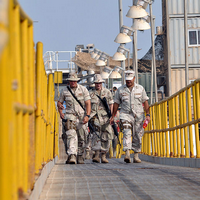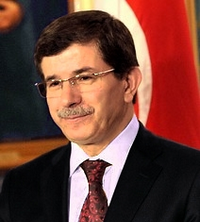Secretary of State Hilary Rodham Clinton speaks at the U.S.-Islamic World Forum in Doha, Qatar. With respect to finding a peaceful, two-state, solution to the Israel-Palestine conflict, Clinton says: “We support a two-state solution, with Israelis and Palestinians co-existing peacefully and with mutual security. We believe that through good-faith negotiations, the parties can mutually agree on an outcome which ends the conflict and reconciles the Palestinian goal of an independent and viable state based on the 1967 lines, with agreed swaps, and the Israeli goal of a Jewish state with secure and recognized borders that reflect subsequent developments and meet […]
Middle East & North Africa Archive
Free Newsletter
At some point I’m going to make a list of foreign policy non-story stories (in which “Fatah-Hamas Agreement Imminent” will feature prominently). For now, I’ll just direct your attention to the Russian national security adviser’s declaration that nothing is “restricting” delivery of S-300 air defense systems to Iran. This is nothing more than Russia’s political line, unchanged and often-repeated ever since the contract for the sale was signed. “Unrestricted” in this case means that the S-300 system is not covered by any relevant international arms sales agreements because it is a defensive weapon. This does not suggest that delivery is […]

Around this time last year, nostalgia abounded as Iranians inside and outside of the country recounted their memories of the Iranian revolution three decades prior. The Islamic regime, having rolled out the red carpet to commemorate yet another important milestone, looked as impregnable as ever before, and all eyes were on Washington and the new American president to see how he might impact the next evolutionary phase of the 30-year-old Iranian revolution. The idea that the course of this next phase might be dictated not by external actors, but by elements from within Iran itself seemed far-fetched. What a difference […]

Whenever I ponder some of the challenges U.S. foreign policy faces today in Afghanistan, Somalia, or Yemen, I inevitably return to a passage in Bob Woodward’s “Veil,” describing how Mohammad Hussein Fadlallah, after an attempt to assassinate him had failed, was persuaded to restrain his followers in Lebanon from launching attacks on U.S. interests: The Saudis approached him and asked whether . . . he would act as their early-warning system for terrorist attacks on Saudi and American facilities. They would pay $2 million cash. Fadlallah accepted, but said he wanted the payment in food, medicine and education expenses for […]
When Iran announced this week that it would start enriching its uranium stockpiles to 20 percent — a level much closer to that needed for nuclear weapons production — it closed the first chapter in the history of the Obama administration’s foreign policy. That chapter has ended in failure. Now the administration’s push to get started on Chapter Two is already visible, presumably adopting a more muscular American posture to confront international challenges in Iran and beyond. In his first year, President Barack Obama tried a radically different approach from the confrontational policies practiced by his predecessor, George W. Bush. […]

Over the past 30 years, the poisonous effects of Afghanistan’s narcotics industry have steadily transformed Iran’s law enforcement and border security institutions, forcing drastic changes in the way Iran deals with what has become a burgeoning transnational narco-insurgency on its southeastern frontier with Pakistan and Afghanistan. Iran’s police chief, Brig. Gen. Ismail Ahmadi Moqaddam, announced last October that Iranian authorities are now using remote security surveillance and control systems from Tehran to help monitor and interdict the massive flow of narcotics streaming over the border from Afghanistan. But despite the country’s draconian anti-narcotics laws and aggressive interdiction efforts, Iran remains […]
Iran’s decision to further enrich its LEU to 20 percent clearly adds weight to the case against a purely civil nuclear objective. To recapitulate, not only is Iran now producing nuclear fuel despite not having any reactors to fuel, it is also enriching uranium for a medical reactor despite not having the capacity to transform the higher grade uranium into the fuel rods that reactor requires. In so doing, it crosses yet another threshhold toward achieving at least the “Japan option” of mastering all the component parts of a nuclear weapons capacity, ready for assembly when necessary. At this point, […]
“The CTBT is in big, big trouble,” said Stephen Rademaker at an East West Institute roundtable on the ever-stalled Comprehensive Nuclear Test Ban Treaty last Friday. The remark represented a rare area of consensus on what is otherwise a highly divisive issue. The EWI discussion of the CTBT and its likelihood of ratification by Congress came as a complement to a recently published report by the institute on the subject. With Rademaker, former U.S. assistant secretary of state (2002-2006) and currently senior counsel for BGR Group’s Government Affairs division, and Ambassador Robert T. Grey, Jr., director of the Bipartisan Security […]
The NY Times has two interesting articles on a subject I’ve written about before: film and literature inspired by the Iraq and Afghanistan War. Like me, they note the lack of novels, as compared to memoirs, although this is to be expected given the lag-time before good fiction usually appears. Interestingly, they also discuss something that I’d ignored, namely the lack of political criticism in both the literature and cinema that has come out of the wars to date. In some ways, that was implied in my previous remarks, given the nature of the great post-War and Vietnam-era film and […]

In a two-round bidding procedure that concluded in mid-December, the international oil industry regained access to Iraq’s upstream resources for the first time since the 1975 nationalization, with service contracts awarded for the development of 13 major fields. Although some critics denounced the deals as a sell-off of Iraq’s resources to foreigners, Iraqi Oil Minister Husain al-Shahristani negotiated very good terms for them. Production will rise from the current 2.5 million barrels per day (mbpd) to 12 mbpd, and Iraq will be in control of every drop of oil extracted on payment of fees amounting to only $1 to $1.50 […]

“Iran engagement” is beginning to take on the attributes of kabuki theater, with all of the major participants engaging in pre-determined, stylized dance steps. The latest case in point is the announcement earlier this week by Iranian President Mahmoud Ahmadinejad that Tehran is now open to some form of the scheme proposed by the International Atomic Energy Agency last October, by which Iran would export its low-enriched uranium to France and Russia to be turned into fuel rods for its research reactor. As Howard LaFranchi reported, this “was received favorably by Russia, and it prompted Chinese officials to call for […]
Here are a few of this week’s highlights from WPR’s video section: – Iranian President Mahmoud Ahmadinejad returns to the negotiating table with a deal that makes some observers wary. WorldFocus discusses the warranted skepticism in this video. – Afghan farmers receive attention from the USDA as one of the United States’ top non-military priorities. Secretary of Agriculture Tom Vilsack briefs the press in this video. And agricultural initiatives can be seen at work in this video. – Secretary of State Hillary Clinton discussed positive developments in N. Ireland in this video. Our video section is updated daily. I’ll highlight […]
The New America Foundation and WorldPublicOpinion.org host anevent on what the Iranian public really thinks on key issues and itsimplications for US foreign policy. In this discussion,WorldPublicOpinion.org presents the findings of an in-depth analysis oftwelve well-documented polls from three different sources addressingthe central questions of whether the Iranian people perceive theirgovernment as illegitimate, how they voted in the June 12th election,and how the opposition views the US and Iran’s nuclear program.
WorldFocus’ Daljit Dhaliwal speaks to Geneive Abdo of the CenturyFoundation about the implications of President Ahmadinejad’s latestcompromise for a nuclear agreement. Skeptics look to impendingsanctions on Iran as well as planned protests in Iran next week asmotivation for Ahmadinejad’s latest deal.
Whether or not he’s actually dead, Hakimullah Mehsud illustrates one of the dangers of a CT strategy based on organizational decapitation — namely, that the No. 2 guy waiting in the wings might actually prove to be more dangerous than the guy whose charred boots he filled. A similar phenomenon has been noticeable among the Basque ETA terrorist group, which has replenished its ranks with what appears to be an even more militant younger generation. (Of course, Americans need only look to their own very recent past for another useful illustration.) I have admittedly been among those who have made […]

Early this past January, Turkey’s ambassadors from around the world gathered in Ankara for their annual meeting. The five-day gathering had the usual elements of gatherings from previous years: the seminars and debriefings, and the traditional group visit to the austere mausoleum of Mustafa Kemal Ataturk, modern Turkey’s secularizing founder. But there were also some significant differences this time around. Turkey’s foreign policy profile has increased dramatically in recent years, and the ambassadors’ meeting coincided with visits to Ankara by the Japanese, Brazilian and German foreign ministers, all of whom addressed the Turkish envoys. Turkey’s top diplomats were treated to […]
Former British Prime Minister Tony Blair testified before a governmentinquiry in London into the Iraq war. Blair remains adamant that hisdecision to go to war was the right one, saying that Sadaam Hussein was”a monster” and someone who he and former U.S. President George Bushhad to “deal with.” VOA’s Sonja Pace reports.
